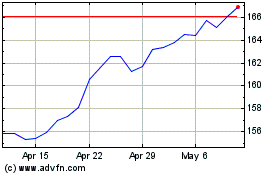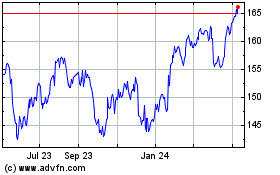By Jon Sindreu
U.S. stocks edged lower Tuesday as investors considered a mixed
batch of corporate earnings.
The Dow Jones Industrial Average slipped 24 points, or 0.1%, to
18199 shortly after the opening bell. The S&P 500 dropped 0.2%,
and the Nasdaq Composite fell 0.1%.
Shares of Under Armour slid 14% after the athletic apparel
maker, whose profits grew in the third quarter, tempered its growth
expectations going forward.
Consumer-goods company Procter & Gamble posted an unexpected
rise in profit and gained 3.8%. Apple, which is set to report
earnings after the close of U.S. markets, edged up 0.3%.
Markets have generally steadied this week amid
better-than-expected corporate earnings and signs of stronger
health in developed nations across the globe. Business confidence
in the German manufacturing sector hit a two-year high in October,
according to data released Tuesday. On Monday, purchasing managers'
surveys showed activity in the eurozone at a 10-month high.
In Europe, the Stoxx Europe 600 slipped 0.1%.
A bright spot was the telecommunications sector. France's
biggest phone carrier, Orange SA, gained 4.5% after reporting a
0.4% increase in sales in the third quarter.
Investors also rewarded Swiss pesticide maker Syngenta AG, which
rose 1.6% after announcing sales in line with analyst expectations.
Another Swiss giant to report figures Tuesday, pharmaceutical
conglomerate Novartis AG, edged down 2.6%, despite its net income
rising in the three months to September.
Meanwhile, shares in troubled Italian lender Banca Monte dei
Paschi di Siena SpA were on a roller-coaster ride as investors
remained undecided about its turnaround plan, which will include
slashing 2,600 jobs and shutting 500 branches. After rising more
than 20% early morning, the stock was off 17% -- but is still up
roughly 60% over the past month.
Most investors are cautiously optimistic about the final quarter
of the year. The U.S. election and the Italian constitutional
referendum remain major concerns.
"Many of the uncertainties plaguing the eurozone economy may
have faded somewhat, but concerns about geopolitical risks,
instability in the financial sector and monetary policy are far
from likely to fade into the background permanently," said ING
analyst Bert Colijn.
U.S. investment manager BlackRock warned Tuesday that U.S.
earnings look better because analysts had previously lowered their
expectations.
"Early third-quarter earnings have beaten these reduced
expectations at a higher-than-average rate," said Richard Turnill,
BlackRock's chief investment strategist. "Yet fewer companies are
raising their future guidance than in a typical quarter."
Nevertheless, U.S. economic data for the third quarter, set to
be released Friday, is broadly forecast to show the world's biggest
economy growing at a faster pace. Markets price in a 74% chance
that interest rates will be higher by December, since strong growth
would clear the way for the Federal Reserve to tighten policy.
As a result, the dollar has risen against other major currencies
this month, pushing the euro to an eight-month low and the renminbi
to its lowest since 2010. Still, markets are less concerned than
they were earlier in the year about a sudden devaluation of the
Chinese currency.
"We don't think that the renminbi will depreciate much this
year, because the U.S. dollar does not have so much potential to
appreciate," said Amundi Asset Management strategist Bastien Drut.
"We don't believe there can be an acceleration of growth next year"
in the U.S., he said.
On Thursday, U.K. officials will provide a first glimpse at
post-Brexit Britain by releasing gross domestic product figures for
the third quarter. Economists expect households and businesses to
have shrugged off any immediate adverse effects stemming from the
U.K.'s vote to leave the European Union in June.
Strong data could lead markets to expect less monetary stimulus
from the Bank of England, which recently reignited its bond-buying
program -- known as quantitative easing, or QE.
For global investors, the question now is whether to fully
embrace risky assets after years in which ultrasafe bonds have been
the star performers due to loose policies by central banks.
This month, bond yields have started creeping up, a tentative
sign that stronger economic growth -- and worries that central
banks have reached the limits of their powers -- may put an end to
the rally in fixed income. BlackRock has already warned that 2017
could be "a rough year" for bonds.
Paul Griffiths, chief investor at First State Investments,
believes bonds remain globally overvalued, but stresses that they
can remain this way for years before they sell off.
"Whilst there is a steady level of QE happening across the world
the ability for bond yields to move in a sustained manner to more
normal levels is unlikely," he said.
Asian equity markets painted a mixed picture Tuesday, dragged
down by disappointing South Korean GDP data, which drove the Kospi
index to edge down 0.5%. By contrast, a weaker yen boosted the
Japanese Nikkei 225, which rose 0.8% and reached a six-month
high.
Write to Jon Sindreu at jon.sindreu@wsj.com
(END) Dow Jones Newswires
October 25, 2016 09:57 ET (13:57 GMT)
Copyright (c) 2016 Dow Jones & Company, Inc.
Procter and Gamble (NYSE:PG)
Historical Stock Chart
From Mar 2024 to Apr 2024

Procter and Gamble (NYSE:PG)
Historical Stock Chart
From Apr 2023 to Apr 2024
